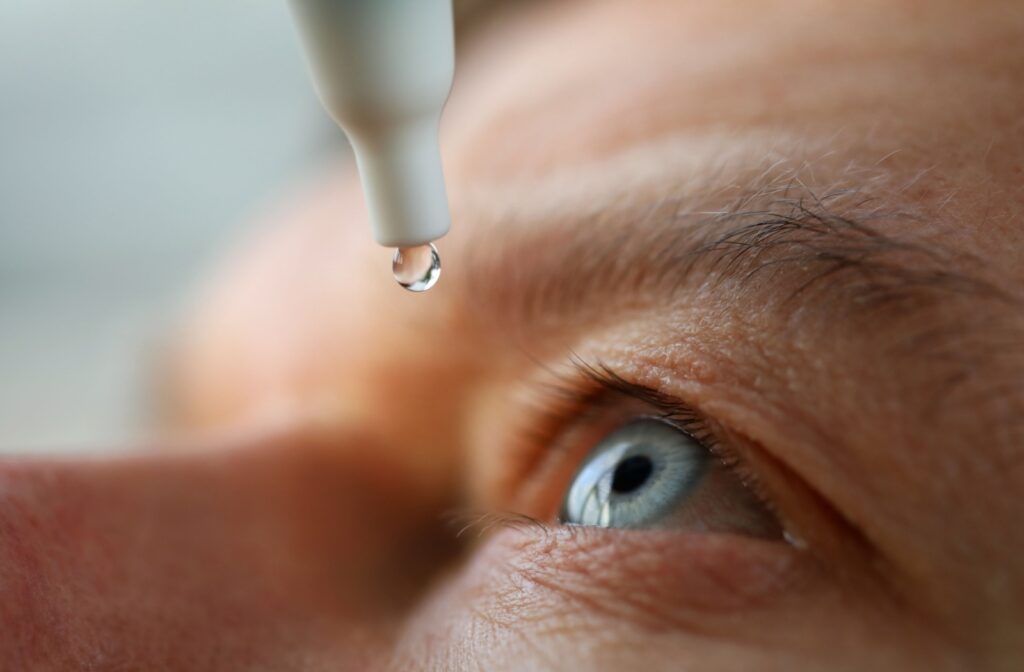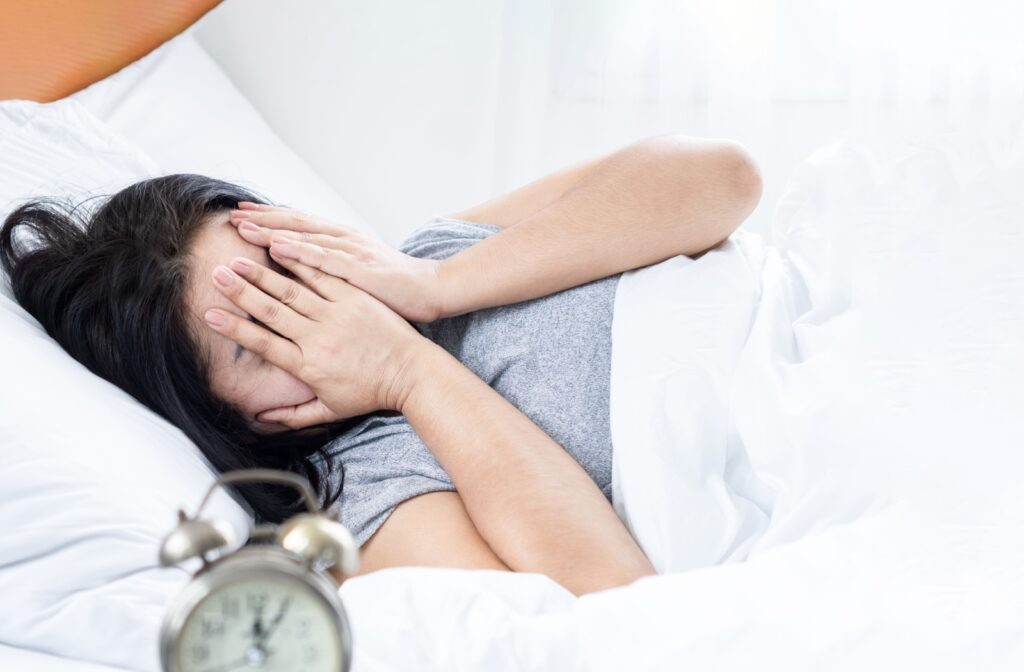Mornings can be challenging, especially when you wake up with irritated or scratchy eyes. Even the most energetic morning person may feel tempted to press snooze when dry eyes make starting the day difficult. If you’ve noticed this frustrating issue in your mornings, you’re not alone—and there are ways to find relief.
You may wake up with dry eyes because of allergies, dry air, or an underlying issue affecting your tear quality. With so many potential causes, you’ll be happy to know your optometrist can help you unpack what your eyes are telling you and how you can take steps toward healthier mornings.
What Is Dry Eye?
Put simply, dry eye is caused by a lack of adequate lubrication on the surface of your eyes. This occurs when your eyes either don’t produce enough tears or the tears evaporate too quickly due to poor quality.
Tears play a vital role in maintaining eye health. They don’t just keep your eyes moist; they also protect against infection, remove debris, and ensure a smooth surface for clear vision. When your tear film—a thin layer of moisture that coats your eyes—doesn’t perform as it should, it leads to symptoms like:
- A stinging, burning, or scratchy sensation in the eyes
- Sensitivity to light
- Red eyes
- Feeling like you have something in your eyes
- Blurry vision
- Watery eyes, which is the body’s response to eye irritation
There are 2 types of dry eye:
- Aqueous deficiency: Dryness caused by a lack of tear production.
- Evaporative dry eye: Dryness caused by tears evaporating too quickly, often due to issues with the oil glands in your eyelids, known as meibomian glands.
Understanding the root of your dry eye symptoms can help your optometrist narrow down specific solutions.
Why You May Wake Up with Dry Eyes
Experiencing dry eyes in the morning isn’t uncommon, and several factors could be at play. Here’s a closer look at why it happens:
1. Sleep Environment
Sleeping in a dry room can cause your natural tears to evaporate overnight, leaving your eyes feeling irritated and unprotected when morning comes. Things like air conditioning, heaters, or fans running throughout the night can make it even worse by pulling moisture out of the air.
If this sounds familiar, it might be time to tweak your nighttime setup to give your eyes a little extra love while you sleep!
2. Nocturnal Lagophthalmos
Nocturnal lagophthalmos is a condition that occurs when your eyelids don’t close fully at night, leading to increased evaporation of tears. Without a proper seal over your eyes, the exposed surface becomes dry and irritated by morning.
3. Allergies
Allergies can be a real hassle—especially for your eyes. Whether they come and go with the seasons or stick around all year, they often lead to irritation, redness, and that uncomfortable dry feeling we all dread.
And if you’re sleeping in a space with allergens like dust or pollen floating around, your symptoms can feel even worse by the time you wake up. It’s like your eyes just can’t catch a break!

4. Medication Side Effects
Some common medications, like antihistamines for allergies, antidepressants, or even decongestants for colds, can mess with your tear production. They might leave your eyes feeling dry, especially when you wake up in the morning. It’s something to keep in mind if you’ve noticed your eyes feeling scratchy or uncomfortable lately!
5. Underlying Tear Production Issues
As discussed, dry eye syndrome happens when your tear glands don’t produce enough tears or when the tears are low quality. This can happen for several reasons, including:
- Age
- Hormones changes
- Health conditions, such as autoimmune diseases
- Overusing or sleeping in contact lenses
How to Relieve Dry Eyes in the Morning
While waking up with dry eyes is unpleasant, there are effective ways to address it. Here are some tips and strategies to soothe your eyes and help prevent dryness:
- Use a humidifier: Increase moisture in your bedroom to counteract dry air. A portable humidifier can make an immediate difference by maintaining a balanced environment. Just ensure you keep it clean to prevent mold growth that could trigger allergies.
- Apply artificial tears: Lubricating eye drops keep your eyes hydrated and can be used before bedtime and after waking up.
- Wear a sleep mask: An eye mask can help prevent your tears from evaporating by creating a humid micro-environment around your eyes as you sleep.
- Limit evening screen time: Prolonged screen time can strain your eyes and cause you to blink less, leading to drier eyes overnight.
- Stay hydrated: Drink plenty of water throughout the day to support your tear production as dehydration can worsen dryness.
Don’t underestimate the power of optimizing your bedtime routine. Here’s what we suggest:
- Clean your bedding regularly: Remove allergens like dust and pollen to avoid triggering allergies.
- Adjust your fans or AC settings: Keep airflow directed away from your face.
- Shower before bed: This helps wash off allergens that may accumulate on your skin or hair during the day.
When to See an Eye Doctor
If your symptoms persist despite trying these remedies, it may be time to seek professional care. Dry eyes may point to underlying conditions that require targeted treatment, such as:
- Intense pulsed light (IPL) therapy
- LipiFlow heat treatment
- Low-level light therapy (LLLT)
- Amniotic membrane
- Punctal plugs
Your optometrist can assess your unique needs during an eye exam and recommend solutions tailored to your lifestyle and overall health.
Better Mornings Start with Healthier Eyes
Waking up with dry eyes doesn’t have to be your morning norm. By understanding the causes and implementing proactive solutions, you can enjoy greater comfort and clarity as the day begins.
If your mornings still feel like a battle against gritty, irritated eyes, booking an appointment with ProOptix Eye Care is the next step. Our experienced and friendly team is here to help you get to the root of the problem and create a personalized plan for relief.
Start your path to healthier eyes today—schedule your eye exam with us and wake up ready to take on the day!





